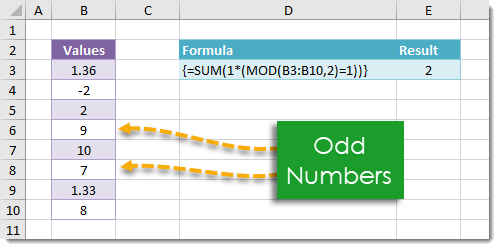
Example
Generic Formula
Note: This is an array formula. Do not type out the {} brackets. Hold Ctrl + Shift then press Enter while in Edit Mode to create an array formula.
Range – This is the range of values which you would like to count all odd numbers from.
What It Does
This formula will count all the odd numbers from a given range of values. An odd number is defined as any number that has a remainder of 1 when divided by 2.
How It Works
The MOD function returns the remainder of a number on division by another number. For example MOD(7,2) will return 1 since the remainder of 7 divided by 2 is 1. We use the MOD function to test if a number is odd. A number will be odd if and only if the remainder on division by 2 equals 1. In other words, N is odd if and only if MOD(N,2)=1.
MOD(Range,2)=1 will create an array of Boolean values where TRUE will mean the number is odd and FALSE will mean the number is not odd. We then convert these TRUE and FALSE values to 1 and 0 values by multiplying the array by 1. This will give us the count of the number of odd numbers in the range.
In our example MOD({1.36;-2;2;9;10;7;1.33;8},2)=1 will result in the following Boolean array.
When we multiply this by 1 we get {0;0;0;1;0;1;0;0}. Then SUM({0;0;0;1;0;1;0;0}) results in 2 which is the count of odd numbers in our range of values.
 👉 Find out more about our Advanced Formulas course!
👉 Find out more about our Advanced Formulas course!




0 Comments